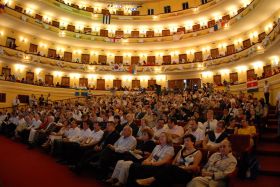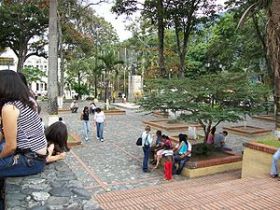What's it like to live in Yucatan: Riviera Maya, Playa del Carmen, Cancun, Merida, etc? How’s the lifestyle?
Alfonso Galindo - I Go Yucatan
 Yucatecans consider themselves Yucatecans first, Mexican second. They’re very proud of their state. It is a delight to live here. The cultures and customs of indigenous Mayans and the Yucatecans were around even before Cortes got to Mexico City, at the time of Teotihuacan (the Aztec capital before the Spanish conquest of Mexico). It’s very safe, it’s great to raise a family, and it’s great for retirees. The only downside for some is during the...
Yucatecans consider themselves Yucatecans first, Mexican second. They’re very proud of their state. It is a delight to live here. The cultures and customs of indigenous Mayans and the Yucatecans were around even before Cortes got to Mexico City, at the time of Teotihuacan (the Aztec capital before the Spanish conquest of Mexico). It’s very safe, it’s great to raise a family, and it’s great for retirees. The only downside for some is during the... Yucatecans consider themselves Yucatecans first, Mexican second. They’re very proud of their state. It is a delight to live here. The cultures and customs of indigenous Mayans and the Yucatecans were around even before Cortes got to Mexico City, at the time of Teotihuacan (the Aztec capital before the Spanish conquest of Mexico). It’s very safe, it’s great to raise a family, and it’s great for retirees. The only downside for some is during the summer. The hottest time of the year are the months of May and June, when it can get between 90 to 110F, which some people don’t like. But I always come back and ask them what’s the temperature in Bakersfield or what’s the temperature in Arizona during the summer months? If you put the two numbers together then you can be here in the summer and it’s actually quite comfortable.
Yucatecans consider themselves Yucatecans first, Mexican second. They’re very proud of their state. It is a delight to live here. The cultures and customs of indigenous Mayans and the Yucatecans were around even before Cortes got to Mexico City, at the time of Teotihuacan (the Aztec capital before the Spanish conquest of Mexico). It’s very safe, it’s great to raise a family, and it’s great for retirees. The only downside for some is during the summer. The hottest time of the year are the months of May and June, when it can get between 90 to 110F, which some people don’t like. But I always come back and ask them what’s the temperature in Bakersfield or what’s the temperature in Arizona during the summer months? If you put the two numbers together then you can be here in the summer and it’s actually quite comfortable. The lifestyle here in Yucatan is a lot slower than in North America; lot more laidback. I don’t think Yucatecans know what a watch is; nobody ever arrives on time to anything. I don’t think they arrive on time to their own weddings and that’s not a Mexican thing, it’s a Yucatecan thing. I’ve been told many times that it’s not necessarily the mañana syndrome, but because of the weather – until very recently, there would still be siestas here at 2 o’clock, when everything will shut down. Banks, restaurants, etc., would shut down and people would go home because it’s the hottest time of the day, they’re going to have lunch with their family, take their siesta, and come back to work usually around 5 or 6 o’clock. That’s why most people here tend not to eat dinner until late in the evening because people wouldn’t close their shops until late at night, when it was a lot cooler. It is a lot slower, which does take a lot of getting used to. I know many expats have a hard time with that at first until finally something clicks in their head that they’re not going to change 500 years of custom here overnight and if they want to survive happily they might as well accept it. I still have the bad habit of arriving early to my appointments but now I just don’t get angry, because I know that 99% of the time, the other people are going to be late.
The cost of living is very affordable here. Your medical care is very affordable. If you don’t buy you can rent a home under $400; very affordable. Specifically in Merida, there are activities to do every single day and night of the week. Sometimes you wish you had more time because there are activities sometimes twice on the same day that you can’t get to that and you really wanted to do. So the activities here are great. You will never ever be bored, because there’s always something to do here in local Merida.
If you’re an Indiana Jones type that loves to go and explore the Mayan archeological sites, you probably won’t see all of them in your lifetime. They’re everywhere. There are over 5,000 archeological sites just here in Yucatan, and that’s just the official ones. There’s over 3,400 cenotes. People are building brand new developments all the time and run into an archeological site that they have to wait to get examined.
A cenote is an underground cavern that has water in it. There are no rivers and lakes in Yucatan. Most of the cenotes are interconnected into one of the largest aquifers in the world, and one of the largest underground river systems in the world. A lot of cenotes are literally underground caves that have caved in and have opened up. Some are ground level. Some are a little bit low that you have to do some rappelling to get into them. They’re quite beautiful. Stalagmites and stalactites are inside, and many of them have pre-historic fossils; dinosaur fossils, Mayan fossils, Mayan bones. They’re very magical to explore and they are considered magical and sacred by the ancient Mayans. It’s a big, big tourist attraction; they’re quite beautiful to go see and worth the time.
There are so many good things – the lifestyle, cost of living, medical, things to do, things to eat. The local gastronomy here is very good, one of the best in Mexico. Yet Merida has grown not only as a larger city but also as a very culturally active city. The food culture and opportunities in Merida have been growing with a new gastronomy, coming in around the world. If expats miss their home then they can eat at a Thai restaurant or a French restaurant. Yucatan is giving Mexico City a run for their money and Mexico City is world renowned for their food.
(Patrons enjoying the opera at the Teatro Jose Peon Contreras, Yucatan, Mexico, pictured.)
Posted September 12, 2015
Gary De Spiegelaere - Celestun Properties
Living in the Yucatan is absolutely beautiful. It’s a little piece of paradise. The weather is wonderful, the beaches are nice, the people are very friendly and family-oriented, and if you can’t buy what you need here, you don’t really need it.
 I could say the same about Celestún, a small fishing village of 7,500 people in the state of Yucatan where I live, except that if you live in Celestún, you have to buy everything in...
I could say the same about Celestún, a small fishing village of 7,500 people in the state of Yucatan where I live, except that if you live in Celestún, you have to buy everything in... Living in the Yucatan is absolutely beautiful. It’s a little piece of paradise. The weather is wonderful, the beaches are nice, the people are very friendly and family-oriented, and if you can’t buy what you need here, you don’t really need it.
 I could say the same about Celestún, a small fishing village of 7,500 people in the state of Yucatan where I live, except that if you live in Celestún, you have to buy everything in Merida because Celestún is a small village and there is not a lot of shopping here.
I could say the same about Celestún, a small fishing village of 7,500 people in the state of Yucatan where I live, except that if you live in Celestún, you have to buy everything in Merida because Celestún is a small village and there is not a lot of shopping here. I live on the water to the point where I can throw a rock underhand into the ocean from my property. I can sit on my terrace in the morning, have coffee, and maybe see one other person or two other people. It is very quiet, very private, and very beautiful. Celestún is a safe place, we have a much lower cost of living, medical care is half the amount it costs in North America, and dental care is about 15% of how much it costs in North America for the same quality. The temperature here ranges from 85 to 90 degrees Fahrenheit in the summer and 70 to 80 degrees in the winter.
I am a more private person so I do not mix a lot with either the foreigners or the locals. I do a lot of my visiting with tourists who come here. Whenever I see tourists, I always stop and ask if I can help them find anything. They give vast amounts of information about their life, which is pretty neat, and all they ask in return is that you tell them where they can see alligators in Celestún, or where they can see flamingos, which Celestún is famous for. That is where I get a lot of my social interaction here in Celestún. My wife’s family is around a lot and she has a lot of friends who come all the time. I do a lot of business on the Internet, during which I interact with people from all over the world. Once a week, in Merida, we go see additional friends. Celestún is a little bit isolated but you could select your friends and still have good social interaction.
(The Raquel Welch 1970 television special partly filmed in Yucatan, Mexico, pictured.)
Posted December 26, 2015
Mikki James
 Living here in the Yucatan Peninsula is heaven. I have no hesitations about saying that. It’s so peaceful and the people here, where I live in particular, are so kind and thoughtful. I live in the small fishing village of Progresso, in the state of Yucatan, about 45 minutes away from Merida by car.
Living here in the Yucatan Peninsula is heaven. I have no hesitations about saying that. It’s so peaceful and the people here, where I live in particular, are so kind and thoughtful. I live in the small fishing village of Progresso, in the state of Yucatan, about 45 minutes away from Merida by car.Even if the people here simply suspect you might be having problems or issues, they come to you with open arms to try and help. Everybody is so helpful. If...
 Living here in the Yucatan Peninsula is heaven. I have no hesitations about saying that. It’s so peaceful and the people here, where I live in particular, are so kind and thoughtful. I live in the small fishing village of Progresso, in the state of Yucatan, about 45 minutes away from Merida by car.
Living here in the Yucatan Peninsula is heaven. I have no hesitations about saying that. It’s so peaceful and the people here, where I live in particular, are so kind and thoughtful. I live in the small fishing village of Progresso, in the state of Yucatan, about 45 minutes away from Merida by car.Even if the people here simply suspect you might be having problems or issues, they come to you with open arms to try and help. Everybody is so helpful. If they have one tortilla and one bean, they’re going to split it right down the middle and give you half.
And they’re very eager to share their culture with you and to learn about yours. A lot of people here, especially down here in Progreso where I live and in Merida, really go out of their way to practice speaking English because they want to communicate. They want to learn about you and about where you’re from and the differences in culture. They get the same TV programs we do more or less but it’s all dubbed over in Spanish.
When my granddaughter was 7, she moved down here to live with me. When she first got here, she was a little nervous. We put her in the public school right down the block from where I live. We did not want to put her in one of the American or Canadian academies. She didn’t like it at first, but within three months she was speaking, writing, and reading Spanish fluently, and she didn’t want to go back to the States.
It’s the people who make this place what it is. They are so laidback and not in a hurry. As expats we call it “Yucateco Time.” Back in the States, everybody runs on a timetable. Everybody is on a schedule. Here, when somebody plans a celebration or invites you for a barbecue and they tell you we’re going to start about 3 o’clock, at about 6 o’clock people start showing up.
This is in contrast with other parts of Mexico. For example, up in northern Mexico, where Monterrey is located (about 3 and a half hours from Loreto, Texas), you tell somebody that you’re going to be there at 1 o’clock and people are generally there 10 to 20 minutes early.
But down here in the Yucatan, oh goodness, no. You might wait three days on a plumber. But it’s all good. Once he shows up he does his thing and it’s over and done with. Personally, I have learned not to stress. I don’t find myself sitting around and banging my nails on my desk waiting. “Where is this guy? Where is this guy? I’ve got things to do. I’ve got places to go. I have to do this. I got to do that.” No, I just do what I have to do and come back home and the plumber just shows up.
It’s the same in Merida. I can’t say about the state of Quintana Roo (also in the Yucatan Peninsula, and containing the very popular expat destinations of Cancun, Playa del Carmen and Tulum) or any of the other places because I haven’t lived there. But, one thing that I do know is Progreso and the state of Yucatan.
(Mikki James and friend in costume, Yucatan, Mexico, pictured.)
Posted January 22, 2016
Andy James
 In Yucatan, the lifestyle is more relaxed, there’s less of a rush, and it’s more outdoors, but that’s not to say you’re hiking up and down mountains like you would in British Columbia or somewhere like that. You wouldn’t call it an outdoors lifestyle in terms of sports, but rather in terms of spending a lot of your time outdoors.
In Yucatan, the lifestyle is more relaxed, there’s less of a rush, and it’s more outdoors, but that’s not to say you’re hiking up and down mountains like you would in British Columbia or somewhere like that. You wouldn’t call it an outdoors lifestyle in terms of sports, but rather in terms of spending a lot of your time outdoors. In Canada, it was different for me because I’ve worked for myself for 20 years, so...
 In Yucatan, the lifestyle is more relaxed, there’s less of a rush, and it’s more outdoors, but that’s not to say you’re hiking up and down mountains like you would in British Columbia or somewhere like that. You wouldn’t call it an outdoors lifestyle in terms of sports, but rather in terms of spending a lot of your time outdoors.
In Yucatan, the lifestyle is more relaxed, there’s less of a rush, and it’s more outdoors, but that’s not to say you’re hiking up and down mountains like you would in British Columbia or somewhere like that. You wouldn’t call it an outdoors lifestyle in terms of sports, but rather in terms of spending a lot of your time outdoors. In Canada, it was different for me because I’ve worked for myself for 20 years, so I’ve pretty much decided what I’m going to do with my day personally, instead of having somebody else decide for me. The regular expat who’s here in Yucatan may not be working, whereas most people in their home countries have and do work, and that’s the largest difference in being here in Yucatan.
Another difference in living in Yucatan is the time spent with family. Generally, a lot of expats living in Yucatan don’t have a lot of family here, although they do have visitors. A huge amount of their time is freed up by not having to visit family, friends and the large network of people that they have at home. They make a new set of friends, or they don’t, but they have a lot more free time here in Yucatan than they would in their home country.
In Yucatan, you don’t have to make as much money, but there are certain elements of living in Yucatan that cost as much or more than they do north of the border. Living in Yucatan is not necessarily as cheap as some people think. There are elements of living in Yucatan that are more expensive.
(Plaza Bolivar de Tovar, Merida, Yucatan, pictured.)
Posted January 23, 2017


